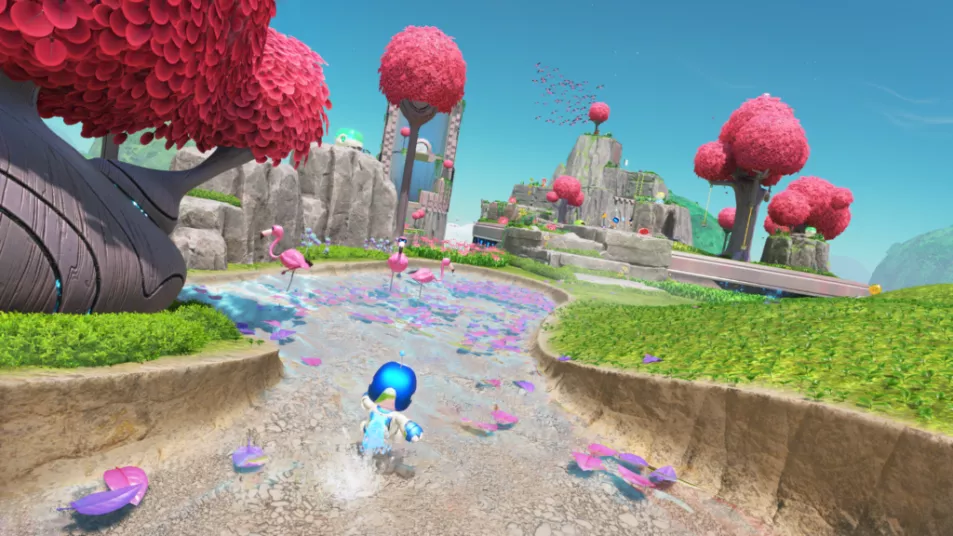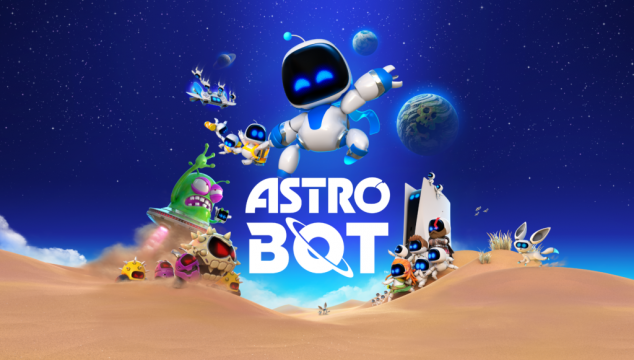Astro Bot began life as a tech demo for the PlayStation 4 called The Playroom, which showed off what the PlayStation Camera and Dualshock 4 could do.
Years later, Astro got his own game with Astro Bot Rescue Mission, which showcased the virtual reality headset PSVR.
The robot's services were called upon once again back in 2020 with the launch of PlayStation 5.
Astro's Playroom was a great platformer which highlighted the DualSense controller's features like haptic feedback and adaptive triggers.
While ultimately it was a short tech demo, it pointed to what the franchise could be.
Four years on, Japanese developer Team Asobi have shown exactly how the series can flourish given time and investment from Sony.
Astro Bot is an excellent 3D platformer that ticks every box: it has fun gameplay, gorgeous visuals, a great soundtrack and impeccable level design.

While Astro's Playroom had just four main areas, Astro Bot has over 50 planets for you to explore, as you are tasked with rescuing the Bot crew (over 300 of them) who are scattered across the universe as your PS5-shaped ship has crash-landed.
Thankfully, your trusty DualSense controller acts as your makeshift ship to explore the galaxy.
Virtual world
The first thing you notice when you drop into any level is just how stunning everything looks. Colours jump off the screen whether you are in a tropical paradise or a cream-covered world.
Metallic surfaces shimmer with the in-game reflection technology, water glistens as the sun illuminates the surface and grass sways in the breeze.
The way Team Asobi has crafted this virtual world is truly impressive, as each new area bristles with life.
The way Team Asobi has crafted this virtual world is truly impressive, as each new area bristles with life.
Astro's basic moves are the same as before; he can punch most things and hover over enemies, killing them with laser beams. It is his various abilities though which really add a lot to his arsenal.
In one of the early worlds, Astro can blow up like a balloon, allowing him to reach higher elevations. In another, you get a torch which reveals invisible platforms, while in another, an armadillo curls up into a ball, allowing you to ride around on it.
Each of the abilities are ingenious and never fail to surprise you with how well they are implemented. In Go-Go Archipelago, the boss utilises all the abilities you learnt throughout the level.
Just like in Playroom, the implementation of DualSense features are superb here as well, every movement big or small is felt through the controller.
Each level is packed with hidden areas and puzzle pieces to discover, giving you a reason to explore. If you find everything, you get a gold flag, which makes going back to 100 per cent each world really addicting.
If you are not sure where to find things, there is also a helpful bird which chirps when you are near something that comes in handy.

Magical moments
While Astro Bot is clearly for a family-friendly audience, there is a joy that permeates the game that will melt even the coldest hearts.
The small details really come through, as every bot you save has a reaction when you hit them, showing off their personality.
There is so much love and care put into every element that when you experience one of those magical moments you cannot help but smile.
Even though this is a game for all ages, there is no doubt it will bring out the inner child in every adult.
Even though this is a game for all ages, there is no doubt it will bring out the inner child in every adult.
Unlike Astro's Playroom where you unearthed old PlayStation hardware, Astro Bot is about finding iconic PlayStation characters out in the wild.
Some parts of the game are even a tribute to the now defunct Japan Studio which Team Asobi emerged from in 2012.

Central hub
It is a touching homage to a studio which made such weird and wonderful games for Sony, such as Ape Escape. Gravity Rush and Tokyo Jungle.
All the bots you rescue in the game are sent back to the crash site, which acts as your central hub. It is a smart move, as the more bots you bring back, the more areas you can access by enlisting their help.
Anytime you whistle (triangle button), they gather around you and help you get to new areas by creating a path. You can also buy each PlayStation icon a unique item with in-game coins, further showcasing their unique identities.
There are some brilliant nods to PlayStation's most iconic characters, which I won't spoil here as they are a wonderful surprise.
Seeing the hub slowly start to populate with these characters, which in turn allows you to unlock more areas, is such a satisfying gameplay loop.
It is what transforms Astro Bot from a mere platformer into a truly compelling experience.
You also unlock the ability to buy new skins for Astro and his ship, which is another incentive to collect coins.
Compared to contemporaries like Nintendo's Super Mario Odyssey, Astro Bot is a class above. The way it constantly reinvents itself with new abilities and new ideas sets a whole new standard for the genre.

Team Asobi has truly evaluated themselves into the upper echelon of developers with how well they crafted this game.
The only possible drawback here is that its boss fights are not particularly difficult or long, but in reality it would be against the spirit of the game to have multi-stage boss battles.
That is exactly what makes this game special: everything is in the service of making the game as fun and accessible as possible.
It is rare to play a game nowadays where, after just a few hours you can tell it is something extraordinary. Not only is Astro Bot one of the best games of this year, it is one of the best video games ever made.
Not bad for a tech demo mascot....







